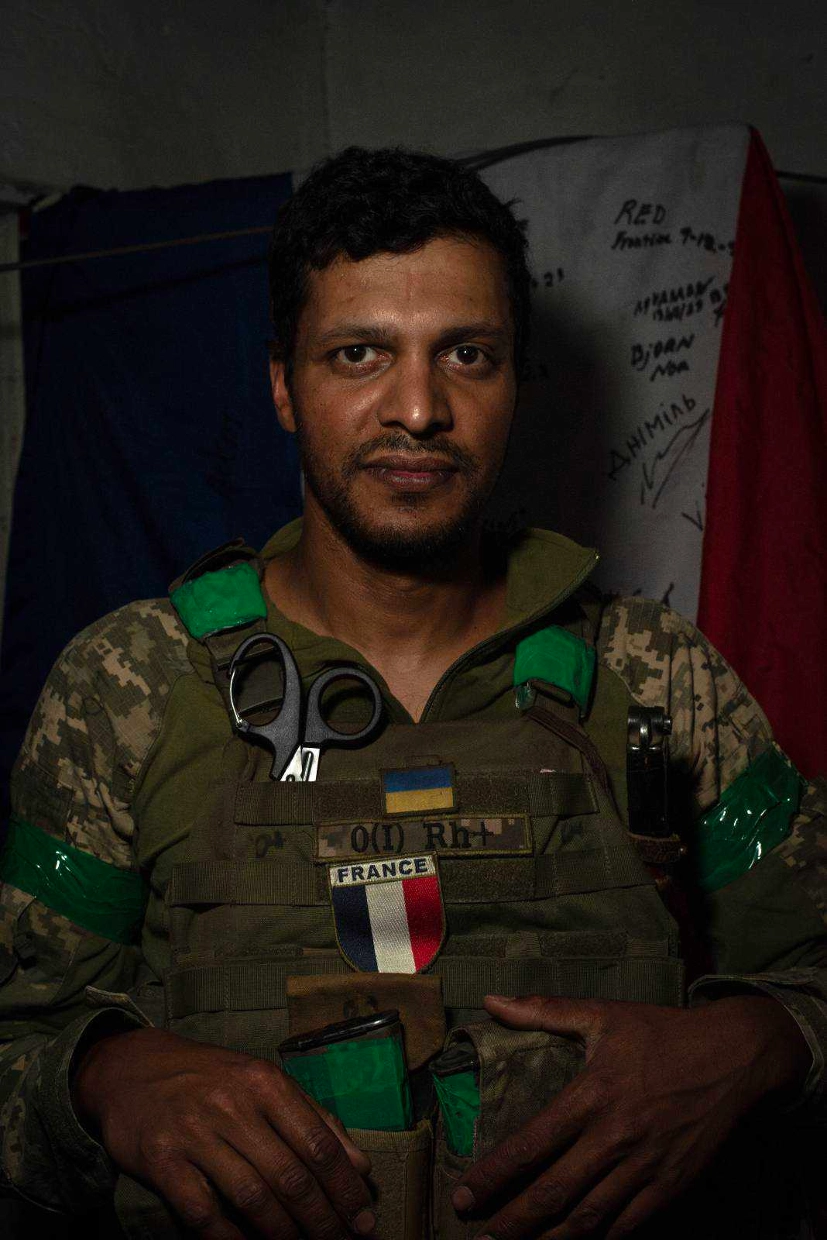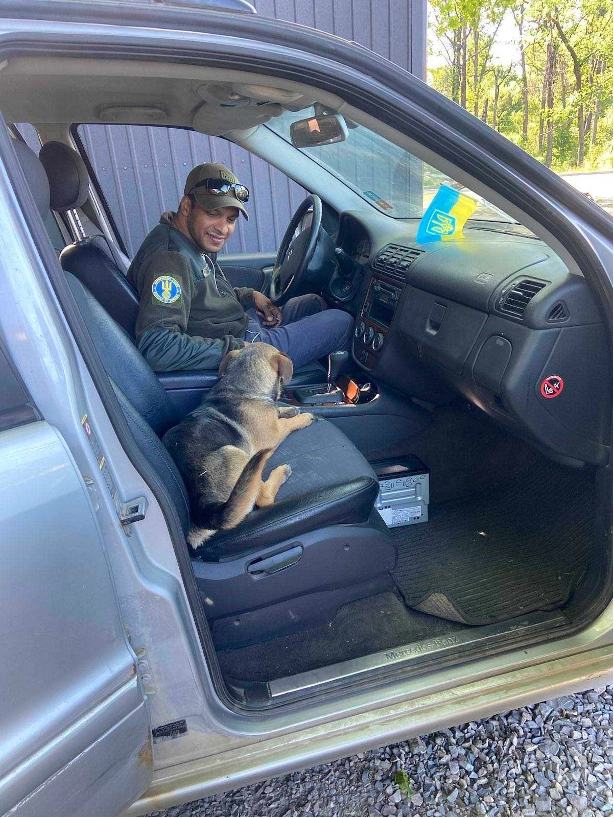In 1995, a French officer and his family befriended a Ukrainian officer in the US Army War College.
Close to three decades later, the son of the French officer came to Ukraine and fought as a soldier for its survival.
JOIN US ON TELEGRAM
Follow our coverage of the war on the @Kyivpost_official.
This is the story of Alexis Drion, the son of a former French Brigadier General, who was purportedly killed in a Russian missile strike on Kharkiv.
His alleged death
When Russia claimed they had killed 60 “French mercenaries” in a Jan. 17 missile attack on Kharkiv, Drion’s name was on the list of dead.
However, not only is he very much alive, but he was also not present in Kharkiv during the strike. He had returned to France in September 2023.
As reported by Kyiv Post, citing an informed source, the list did in fact contain names of French nationals in the Ukrainian military, albeit with transcription errors.
However, the source said he was certain at least some of those named were alive, and the name leak was likely the result of a security breach from the Main Police Department of Ukraine’s Ternopil region, which then made its way to a Telegram channel obsessed with hunting foreign fighters in Ukraine.
“[The Telegram channel] was very stupid, they show the world that they don’t even use good intel,” Drion said, adding that he knows at least two soldiers on the list who were also in France during the strike.
Radio Free Europe identified another French national on the list who turned out to be alive, and AFP was able to get in touch with three more.

‘3 Days in Enemy Territory’ - HUR Officer’s Survival Story
Image: Alexis Drion in Ukraine
Russia has used the false claims to accuse France of deploying guns-for-hire in Ukraine, a move described by the French foreign ministry as “another clumsy Russian manipulation.”
Drion believes Russia is trying to drag Europe into the war through false claims and joked that the French soldiers must be doing a great job to garner such attention.
“I think they [are] trying to get [European countries] into the conflict. But it seems that if they hate us that much, French guys during their service in Ukraine must [be doing] a good job in operations,” Drion told Kyiv Post.
“It’s good that we ended up becoming partners, rather than fighting like animals.”
The Ukrainian connection
Drion’s connection with Ukraine can be traced back to 1995 when his father Frédéric Drion – who retired as a Brigadier General and was chief of the NATO mission to Germany at one point – attended the US Army War College.
It was there that his father befriended Leonid Polyakov, a Ukrainian officer, and his family.
Polyakov had a prominent career in Ukraine and became the first deputy defense minister in 2005-2008, later returning as a deputy defense minister in 2014 soon after the Euromaidan.
Polyakov, in response to a Kyiv Post inquiry, recalled how he met Drion’s father in the 1990s.
“We had 39 so-called IFs, international fellows… The French officer used to be Brigadier General Frédéric Drion. And the Ukrainian officer happened to be myself, Leonid Polyakov,” he said.
They studied together, communicated, and developed a friendly relationship. “Our children were of the same age,” he said. “I had my children and Frederic had his young kids.”
Polyakov said that despite the odds, a friendship formed between him and Drion’s father – partly due to the political climate that arose following the fall of the USSR in 1991, and partly due to the historical connection between the two nations.
“For me, [as a] Ukrainian, France was a friendly country, of course, in some way, quite familiar. Probably music, literature, arts, cinema – and history… starting from very ancient history when the daughter of Yaroslav the Wise [Grand Prince of Kyivan Rus] married a French King,” Polyakov said, referring to Anne of Kyiv, Queen of France, born in 1024.
“For Frédéric and his family, I think it was also interesting to talk to a former Soviet officer back in 1994, just three years after the Soviet Union collapsed.
The French general was trained to fight against the Soviet-led Warsaw Pact. Since France was a member of NATO, discussing hypothetical strategies for World War III came natural to them.
“It’s good that we ended up becoming partners, rather than fighting like animals,” Polyakov said.
When the Berlin Wall fell, Polyakov found himself in Russia as a Soviet officer – “ex-Soviet,” he said – but as a Ukrainian whose life had been entwined with the nation, he refused to take the Russian oath.
“My native country is Ukraine, where I grew up, my parents resided, I got married, and so on,” said Polyakov.
Drion’s decision to fight for Ukraine
Image: Alexis Drion in Ukraine
Close to three decades later, Drion is now a grown man, and he said he couldn’t stand idle after reading reports of how Russia kidnapped children from Ukraine.
Drion added that he had met Polyakov multiple times over the years, and the last time they met, before coming to Ukraine, was in 2018 in Paris, when his parents met the Polyakovs for dinner.
When Drion decided to fight for Ukraine, it was through Polyakov that Drion joined the International Legion in Ukraine between April and September 2023.
He said that while his family was largely supportive of him joining the Legion, his mother was still concerned – but they were reassured to know that Polyakov, a family friend, would help him out.
Polyakov, who had fought in Afghanistan, was also concerned about Drion’s decision.
“War is a place where people fight and sometimes die or become mutilated, wounded,” So knowing the risk involved for the son of his French friend left him somewhat uneasy.
“But he insisted that he felt like he could not respect himself if he didn’t help the Ukrainian people fighting the aggression from the Russian imperial state... He just told me that he booked a ticket, and he is coming,” Polyakov said.
Finally, Drion set foot in Kyiv, a distant land that felt close to his heart, and Polyakov welcomed him warmly into the country.
“[Polyakov] welcomed me like a king, came [to] pick me up [from] my bus, [showed me Kyiv], [and] invited me for dinner… [He gave] me a lot of advice,” Drion said.
But the meeting was brief, and Drion soon departed to the training center, then to the front.
“I tried to find out what the procedure is to help him join the International Legion. So he came. I met him at the bus station to help him find the hostel, and for a few days in Ukraine escorted him around, then said goodbye at the train station… This was the last time I saw him actually, because after that I only communicated via mail platforms and Facebook and so on,” said Polyakov.
“When Alexis was at the battlefield, I was only receiving his field reports. But I’m happy he ended his journey alive and healthy.”
Back in France, Drion continues to help Ukrainians.
“I am greatly obliged for this young man, his courage and his support for Ukraine,” Polyakov said.
Drion’s experience on the front is yet another story, but despite the horrors, he maintained his love for Ukraine and continued to support it from abroad.
“I love Ukraine because even with the war, the country has been safe, and the people were nice and thankful for our service. In Ukraine, I never had any problems with racism,” Drion said.
“For me, as a Catholic, I love seeing that respect for all Christian statues and churches, and I can’t wait to visit more of Ukraine when victory and peace arrive.”
Drion added that Polyakov was lighting candles for him in church when he was on the frontline, and he made sure to keep in touch with Polyakov even after he left Ukraine.
“Every time Kyiv is touched by Russian missiles, we make sure he is alive,” Drion said.
You can also highlight the text and press Ctrl + Enter













